

From Andragogy to Heutagogy. Author: Stewart Hase and Chris Kenyon (2001) Southern Cross University Keywords: Southern Cross University, pedagogy, andragogy, heutagogy, higher education, vocational education, self-determined learning.
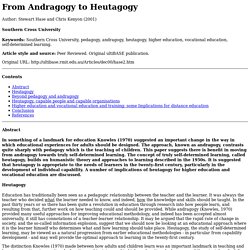
Article style and source: Peer Reviewed. Original ultiBASE publication. Original URL: Contents Abstract In something of a landmark for education Knowles (1970) suggested an important change in the way in which educational experiences for adults should be designed. Heutagogy Education has traditionally been seen as a pedagogic relationship between the teacher and the learner. Reg-revans-manuscripts. 1929-2420-1-PB. Andragogy. The Conditions for Effective Collaborative Learning.
6. Self-Directed Learning. The concept of Self-Directed Learning (SDL) is one which educators have investigated and discussed for many years.
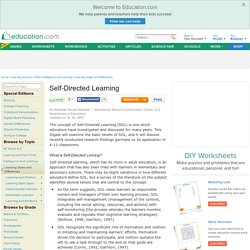
This Digest will examine the basic tenets of SDL, and it will discuss recently conducted research findings germane to its application in K-12 classrooms. What is Self-Directed Lerning? Self-directed learning, which has its roots in adult education, is an approach that has also been tried with learners in elementary and secondary schools. There may be slight variations in how different educators define SDL, but a survey of the literature on the subject identifies several tenets that are central to the concept. Self-directed learning: a four step process. Ll-no10-lr-links. THEMES. Informal and formal learning contexts TLRP focussed upon learning that occurs outside as well as within educational institutions and a range of learning processes and practices, both formal and informal, can occur across formal and informal learning contexts.
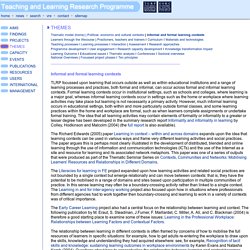
Formal learning contexts occur in institutional settings, such as schools and colleges, where learning is a major goal, whereas informal learning contexts occur in settings such as the home or workplace where learning activities may take place but learning is not necessarily a primary activity. However, much informal learning occurs in educational settings, both within and more particularly outside formal classes, and some learning practices within the home and workplace are formal, such as when learners complete assignments or undertake formal training.
The Early Career Learning project also had a central focus on the relationship between learning and context. The following publication by M. Informal learning: theory, practice and experience. Contents: introduction · informal learning · non-formal learning · tacit knowledge · situated and distributed learning · informal education · conclusion · references · links Informal learning should no longer be regarded as an inferior form of learning whose main purpose is to act as the precursor of formal learning; it needs to be seen as fundamental, necessary and valuable in its own right, at times directly relevant to employment and at other times not relevant at all.
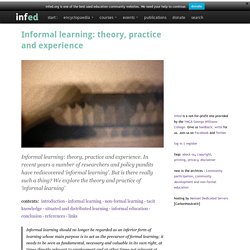
(Coffield 2000: 8) We must move away from a view of education as a rite of passage involving the acquisition of enough knowledge and qualifications to acquire and adult station in life. The point of education should not be to inculcate a body of knowledge, but to develop capabilities: the basic ones of literacy and numeracy as well as the capability to act responsibly towards others, to take initiative and to work creatively and collaboratively.
Introduction. 1076-9232-2-PB. Post_webinar_1_tasks_final. Great tools for data visualization. Most data is meaningless to most people — unless it is visualized.

Stepping beyond familiar visualizations like bar charts and pie charts, there are many approaches to visualizing data, from mapping (e.g., color coding a map to show voting patterns) to visualizing networks (e.g., the links between people). You are not limited to Microsoft Excel, or your own programming abilities. We’re now in an awesome generation for visualization, with dozens of freely available software libraries — which developers have spent months (or years!) Building. Increasingly these use Javascript (so they work in all browsers and mobile devices). Arbor.js is a library of force-directed layout algorithms plus abstractions for graph organization and refresh handling. CartoDB is a web service for mapping, analyzing and building applications with data.
Circos is a software package for visualizing data in a circular layout. Cubism.js is a library for creating interactive time series and horizon graphs based on D3.js. WP-04-04. Memory reactivation during rest supports upcoming learning of related content. Author Affiliations Edited by Daniel L.
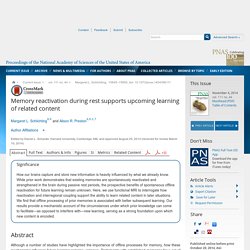
Schacter, Harvard University, Cambridge, MA, and approved August 25, 2014 (received for review March 10, 2014) Significance How our brains capture and store new information is heavily influenced by what we already know. While prior work demonstrates that existing memories are spontaneously reactivated and strengthened in the brain during passive rest periods, the prospective benefits of spontaneous offline reactivation for future learning remain unknown.
Abstract Although a number of studies have highlighted the importance of offline processes for memory, how these mechanisms influence future learning remains unknown. Footnotes. Mental Rest and Reflection Boost Learning, Study Suggests. Oct. 20, 2014 The patterns of brain activity recorded in this fMRI scanner revealed how mental rest and reflection on past learning activities can boost future learning.
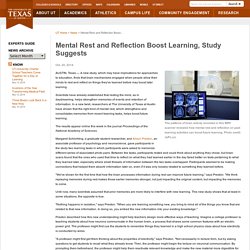
Photo credit: Jeff Luci. AUSTIN, Texas — A new study, which may have implications for approaches to education, finds that brain mechanisms engaged when people allow their minds to rest and reflect on things they've learned before may boost later learning. Scientists have already established that resting the mind, as in daydreaming, helps strengthen memories of events and retention of information. In a new twist, researchers at The University of Texas at Austin have shown that the right kind of mental rest, which strengthens and consolidates memories from recent learning tasks, helps boost future learning. The results appear online this week in the journal Proceedings of the National Academy of Sciences.
Until now, many scientists assumed that prior memories are more likely to interfere with new learning. Working-with-small-groups. WP-03-02. Learning_spaces_v3. Action Research. Action Research. Post_webinar_1_tasks_final. An_Evaluation_of_Undergraduate_Student_Perceptions_of_their_Engagement_and_Attendance. Rutgers-lib-37293-PDF-1. Curriculum Spaces: Discourse, Postmodern Theory and Educational Research - Lisa J. Cary. Isl-2008-papefinal. 13614533%2E2013%2E740961. Practitioner Research Themes (2014-15) Action Research in Education. Search RESINED Home Beginning Research | Action Research | Case Study | Interviews | Observation Techniques | Education Research in the Postmodern Evaluation Research in Education | Narrative| Presentations | Qualitative Research | Quantitative Methods | Questionnaires | Writing up Research Action Research in Education Currently overseen by Maureen McGinty Originally prepared by Dr Stephen Waters-Adams © S Waters-Adams, Faculty of Education, University of Plymouth, 2006 Part One: Introduction Part Two: A Theoretical Underpinning for Action Research in Education Part Three: Doing Action Research Part Four: Limitations and Criticisms of Action Research Part Five: Tasks Part Six: Further Reading 1 Why should I use action research?
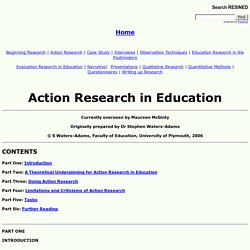
Because you want to change your practice. 2 How does this qualify as research? Because the act of finding your solution makes you understand your practice better – not only what you are doing, but also the factors that affect what you do. 3 What do we mean by practice? By using. Proposed Action Research model1. EQM0312. Learning_spaces_v3.